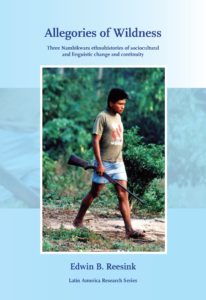Allegories of Wildness ~ The Name, Fame And Fate Of The Nambikwara ~ Three Nambikwara Ethnohistories Of Sociocultural And Linguistic Change And Continuity ~ Contents
No Comments yetA ‘primitive wild people’ that only Rondon could ‘pacify’, that was the reputation of wildness of these ‘savages’ around 1910. Not only that, Rondon also renamed them as the “Nambiquara” and hence, a few years later, this people acquiered its first fame in Brazil with a new name. Actually, colonial expansion and war had been part of their history since the seventeenth century. The crossing of the enormous Nambikwara territories by the telegraph line constructed by Rondon’s Mission produced, as far as known, the first real pacific contact. For those local groups most affected it proved as disastrous as all ‘first contacts’ without any preparation and substantial medical assistance. When Lévi-Strauss travelled through the region the so-called civilization had receded again. His research was very severely hampered by the historical consequences and by the fact the Indians still retained their political autonomy. Yet he has remarked they were the most interesting people he met and regarded this journey as his initiation in anthropological fieldwork. Tristes Tropiques made this people famous to a very large public and fixed another particular image of the Nambikwara. And then, in the seventies and eighties of the last century, the final assault took place by their being “before the bulldozer” (as written by the best known Nambikwara expert David Price). Only after a demographic catastrophy, permanent encirclement and great losses of territory, several Nambikwara local groups coalesced and emerged as peoples while many other local groups perished in this genocide. In effect, the so-called Nambikwara never were ‘one people’. This study explores the ethnohistory of the name, fame and fate of three of these peoples — the Latundê, Sabanê and Sararé — and dedicates some special attention to language loss and maintenance.
© Edwin Reesink, 2010, 2019 – Cover picture: Mísia Lins Reesink – Illustrations: Edgar Roquette-Pinto
© Rozenberg Quarterly 2010, 2019 – Amsterdam – ISBN 978 90 3610 173 8
Contents
Prologue
Part One – Name
Chapter I – Documentary ethnohistory: the convolutions of the right to territory
Chapter II – Latundê ethnohistory and their contemporary situation
Part Two – Fame
Chapter I – The string of events
Chapter II – Converging histories: Rondon, myth, ideology and petty domination
Part Three – Fate
Chapter I – Refractions of wildness: the choreography of war
Chapter 2 – The cartography of war and peace: worlds in collision
A final summation
Bibliography
You May Also Like
Comments
Leave a Reply








